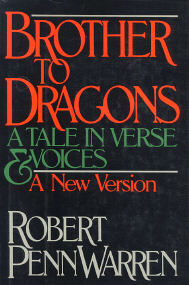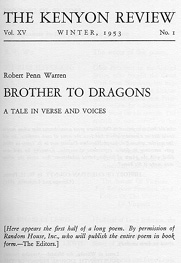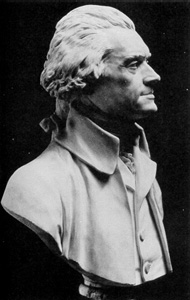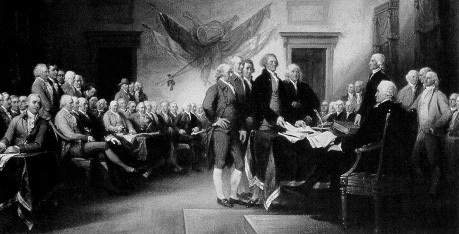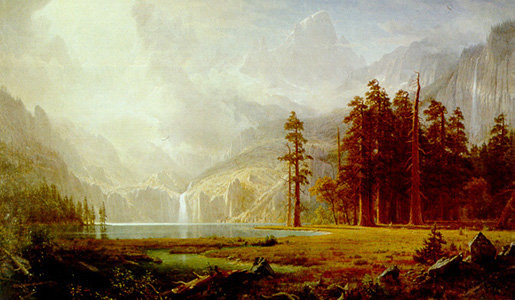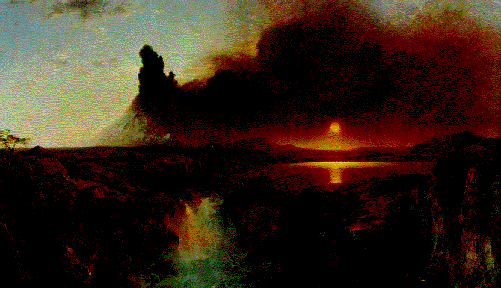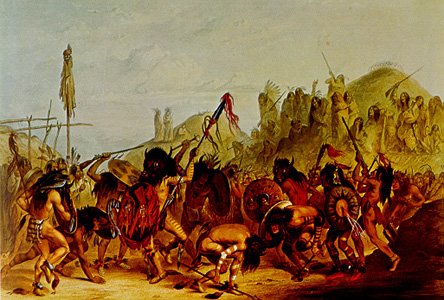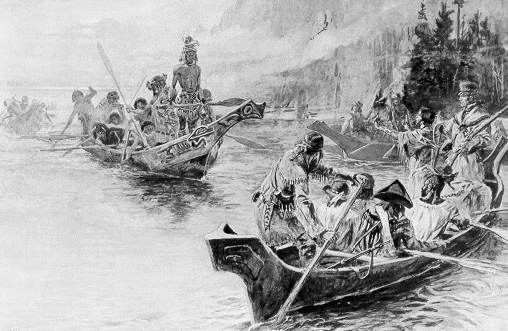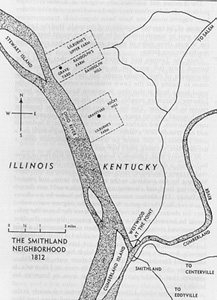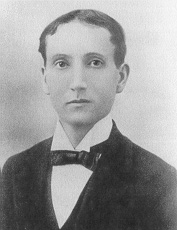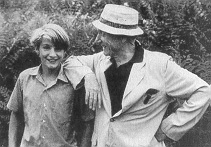**Note** The paper, "Man in his Naked Absoluteness": A Study of Inheritance in Robert Penn Warren's Brother to Dragons, shown below, is reproduced in its entirety and is not the work of the owner of this site. It was originally shown on the web site of Kenyon College and, as of this writing, is still there. The background color here is different. To see the page on the Kenyon web site click here. The owners of this web site express our gratitude for the permission to reproduce this page herein. More information--click here. The statement shown, in part and in italics immediately below, appears on the Kenyon web site. [It is part of the final project for English 93 at Kenyon College. This course was designed by Bruce D. Wallace and Nathaniel N. Salter, both seniors at Kenyon. Judy Smith, Professor of English, provided wonderful and unfailing support and advice as our advisor.] Authors of the paper are Bruce D. Wallace and Nathaniel N. Salter.
|
"Man in his Naked Absoluteness":
A Study of Inheritance in Robert Penn Warren's Brother to Dragons
| You have moved often and rarely left an address, And hear of the deaths of friends with a sly pleasure, A sense of cleansing and hope which blooms from distress; But it has not died, it comes, -Original Sin: A Short Story |
|
In the closing section of Robert Penn Warren's Brother to Dragons, we see the character of R.P.W., who has, up until this point, remained a fairly detached voice of modern cynicism, address a personal transformation that he has undergone throughout the course of the narrative. We are told that, upon leaving the barnlot that has been the setting for this tale, R.P.W. is now "prepared/ To go into the world of action and liability."(132) While the focus of the story has remained largely centered upon events surrounding Lilburne Lewis' crime, the response of his family to the tragic event and their own particular culpability in the events of the story, it has also been about R.P.W. climbing a mountain and facing whatever face he might find there. R.P.W.'s relationship with his father provides a frame through which the rest of these events can be seen. In considering the face these characters must face, it is useful to keep in mind the question which the narrator poses to us midway through the narrative, "Who has seen man in his naked absoluteness?"(22).
The tragic historical end of Meriwether Lewis, Jefferson's supernatural unrest and
R.P.W.'s finally optimistic resolution can all be seen as a result of their ability or
inability to face that which is most repellent in themselves and most antithetical to
their beliefs about the world. For Jefferson this means subjecting his overly simplistic
notion of humanity to the reality of human depravity. For R.P.W. it is just the opposite,
allowing some room for human possibility in his overly pessimistic modern view. By
examining the journeys that the respective son-figures undergo throughout the narrative,
R.P.W.'s journey up the promontory in Kentucky and Meriwether Lewis' journey into the
wilderness of the American West, and the part their acting fathers play in their journey,
we can begin to unravel the web of inheritance to which these characters are heir to, and
explore what significance this inheritance has to them.
As significant as the journey of the sons is the journey of Thomas Jefferson, particularly
when compared to the character that acts as his foil, R.P.W.'s father, who lies slumbering
soundly through most of the poem. As the narrator indicates, his father has climbed his
mountain, has been on this journey upon which the other three are now embarking. To
understand the resolution towards which Warren moves us, we need to consider Jefferson and
R.P.W. in tandem, and see how their two visions, which, at the beginning, are mutually
opposed, move towards some sort of reconciliation at the end. In a review of the 1953
version, Randall Jarrell underlines the relation between these two characters, and
suggests further that all of the characters in this narrative can be seen as different
competing claims within the mind of the author. He says that "The character in Brother
to Dragons most loathingly obsessed with man's dragonish heart is a part of Warren
which he calls Thomas Jefferson"(Grimshaw 161).
The two other key players in Jefferson's final redemption are Meriwether and Lilburne
Lewis, both types of son figures. Both of these characters act as son figures to a greater
or lesser degree; in the case of Meriwether, Jefferson is quite willing to name him his
surrogate son, in the case of Lilburne, he is considerably less ready to recognize his
relation. In addition, both of the characters play a different type of role in Jefferson's
redemption, with Meriwether bringing him to an understanding of the failing of his hopes
for America, and Lilburne bringing evil home, personalizing it to a point where Jefferson
can no longer escape his own responsibility in it. We will consider Meriwether's role in
more depth than Lilburne's, because Meriwether is more clearly an inheritor of Jefferson's
system of values, and because of the expanded treatment Meriwether receives in the new
version of Brother, which indicates a recognition of a deeper significance on the part of
the author. In examining Jefferson, Meriwether and R.P.W.'s journeys, all against the
background of R.P.W.'s father's stasis, we find, quite interestingly, that the expected
pattern of redemption, modeled in the relationship of R.P.W. and his father, is inverted
in the case of Meriwether and Jefferson. In the case of R.P.W., it is the father who leads
the son on his journey, whereas with Jefferson and Meriwether, it is Meriwether who, in
his life, faced what face there was, and by doing so, now is able to lead Jefferson
towards his redemption.
|
Thomas Jefferson's redemptive journey lies at the focal center of the narrative of the book. At first glance, it seems entirely for his benefit that this drama is enacted and reenacted. In order to accurately track Jefferson's journey towards redemption as it occurs in the narrative, it is vital to recognize the significance of Warren's choice of Jefferson as the central character in the narrative. In recognizing the historically loaded nature of Thomas Jefferson as a character, it is necessary to differentiate between the person Thomas Jefferson was in life and the fictional character portrayed in this tale. Thomas Jefferson, in the course of his own lifetime, saw humanity as a source for optimism, and he tried to infuse this dream of the American potential into every person and every piece of land. In discussing the brand of idealism which he finds in the character of Jefferson, Warren says that "It came out of the Enlightenment. It started in the Enlightenment. Man can be made a different creature-by rediscovering his ‘natural' innocence, Rousseauism"(Watkins 344). Jefferson embedded his own ideal within the Declaration of Independence, the symbolic foundation of the nation. In doing this, Jefferson made the error of over-simplifying his vision of human perfectibility. |
Marble bust by Jean-Antione Houdon, 1789. Museum of Fine Arts, Boston. |
It is obvious that Jefferson has acknowledged this error as he arrives at the posthumous gathering of spirits with a considerably jaded view of the human condition. Aware of the historical outcome of the nation in general, and the facts pertaining to his family in particular, he is so disturbed that even after death, he can not rest peacefully. As Jefferson makes his initial appearance in the narrative, he introduces himself as "Jefferson. Thomas. I/ Lived. Died. But/ Dead, cannot lie down in the dark"(5). Despite his death, Jefferson still remains unable to lie down, unable to attain eternal sleep. Furthermore, Jefferson's view of humanity is no longer one of hope, dream or possibility; rather it is one of contempt, grief and pity. At first, Jefferson is reticent to admit to his own responsibility in the murderous crime by his nephew and in the suicide of his surrogate son, Meriwether Lewis. Meriwether is quick to point out Jefferson's role in his own demise, as he says, "And if I'm a Crack-Head now, Old Jeff,/ You ought to recognize your handiwork"(109). Jefferson, denying any involvement, returns with "My handiwork?" (109). With a tone of surprise in his voice, Jefferson affirms his inability to clearly see and accept his involvement in Meriwether's death. Coming to terms with his own responsibility in these events is what finally pulls Jefferson out of his disillusioned state, and after coming to the understanding that he can be both virtuous and brother to dragons, he can finally find his redemption and eternal peace.
Hugh Ruppersburg argues convincingly that Jefferson is suggesting that the Founders were wandering in the midst of a labyrinth, and were unaware of the Minotaur, the lurking possibility of evil that was "hulked/ In the dark, hock-deep in ordure, its beard/ And shag foul-scabbed, and when the hoof heaves – / Listen! – the foulness sucks like mire"(6). In this backward glance into history, Jefferson, through his admission of the lurking possibility of evil within the labyrinth, admits that the Founders were unable to see this aspect in their own potential or that of the nation. This becomes more evident as Jefferson's delinquency in determining the truth of his own destiny is on the surface of the text throughout the narrative. Jefferson attempts to determine the course of his own life by insisting that reason and hope would suffice, that these virtues would preclude the chance that he may have an evil inclination in his spirit. Even when Jefferson did see an "individual evil,/ [He] rationally said, it is only a provisional paradox/ To resolve itself in Time"(7). His own individual acts of evil can thereby be written off as a temporary complication rather than a serious character flaw.
Ruppersburg offers an alternate explanation for the same labyrinth and Minotaur metaphor,
one which was thwarted by the Founder's inability to see the evil in the nature of
humankind. Ruppersburg says they created a "Declaration of Independence and
Constitution which left the new nation unprepared for the hazards to
come"(Ruppersburg 47). America was left vulnerable for the impending hazards again by
the inability of the Founders to reconcile the differences between their aspirations and
the reality of what America could become. It is important to consider both interpretations
that Ruppersburg offers, as one refers to the personal lives of the Founders, while the
other considers the impending failure of the perfectibility of the nation.
|
The Declaration of Independence, by John Turnbull. Yale University Art Gallery. |
The character of Jefferson turns a critical eye to this historical period of overflowing optimism. The overly idealistic live Jefferson is described, even cynically, by the spiritual Jefferson as one who attempted to characterize the nation by applying his morality and his sense of virtue to the masses. On the eve of the creation of the nation, Jefferson, merely a man,
stumbled into/ The breathless awe of vision, saw sudden/ On every face,
face after face,/ Bleared, puffed, lank, lean red-fleshed or sallow, all– / On
all saw the brightness blaze,/ And knew my own days,/ Times, hopes, and
even my love, but straw/ Fit for the flame, and in that fierce combustion,
I – / Why, I was nothing, nothing but joy,/ And my heart cried out:/ "Oh,
this is Man!"(7).
It is clear that in this passage that Jefferson's view is obscured by his inability to
separate the individual face from the abstracted face of the latent possibility of
America. Jefferson placed his ideal on the face of America by identifying his life with
his blurred vision of the nation. Looking back in the narrative, the character of
Jefferson sees this as nothing but straw fit for the flame, as fuel to feed the fire of
Enlightenment thinking. Jefferson admits that what he had done then, the blanket
generalization of the goodness of the human race, might have been foolish and defined
"in [his] errors and interests"(7). However, at the time, this was his hope for
the future. He concedes that perhaps the nation was not conceived in a moment of vision
but rather in a moment of blindness, as he and the Founders "were only
ourselves,"(6) merely humans and equally vulnerable to the lurking evil and
corruptibility of the human spirit (Ruppersburg 46). Jefferson offers the allusion to
"some blind alley, enclave,/ Crank cul-de-sac, coulior, or corridor/ Of Time. Or
self,"(6) as a metaphor which he applies to himself and the nation. In the language
presented here we see the fundamental opposition: the optimism of the time led Jefferson
down a path that ultimately had no end. In other words, Jefferson's optimism and ideal did
not function as a means to lead America towards the high, imagined possibility.
There are some useful comparisons that can be drawn between the idealistic portrayal of
Jefferson and that of the virtuous and humble Job. Many scholars quickly point out the
derivation of the title of this book, found in the Book of Job: "I am a brother to
dragons and a companion to owls"(30:29). Much like Job, Thomas Jefferson perceived
himself to be an upright man, a man of virtue. Both of these men were similar in one
respect – they believed that their virtue and determination to do what is right and
good would be enough to sustain their lives, ignoring completely the possibility that
within their nature they possessed some evil, or that they were remotely close to others
whose nature contained even the slightest evil. Though deluded, both men saw themselves as
"freed, by means of their virtue, from common human contamination"(Strandberg
171).
Victor Strandberg's argument continues along these lines, maintaining that what Warren was
most interested in and focused most clearly on was not "Job's suffering and loss and
endurance," but rather "upon the one thing he could not endure – his loss
of pride"(Strandberg 171). Jefferson and Job differ here, in that for Jefferson, it
was not so much the loss of pride that caused his view of human perfectibility to come
crashing down, rather it was the realization that he, as an individual and as the father
of a nation, was vulnerable to the corrupting nature of humankind. In other words, that he
too, was brother to dragons, brother to the lurking Minotaur with which he admittedly
shares the labyrinth. The character of Jefferson has come to the realization that he may
no longer look at himself as the beacon of reason and possibility on the edge of an
unexplored territory.
Creating the nation in a moment of blindness, leaving it unprepared to face the impending
hazards of the possibility of human corruptibility was an error, and one that permeated
other facets of Jefferson's life. Jefferson viewed the wilderness of America as the
physical embodiment of his "faith in the new nation's potential for growth and
greatness"(Ruppersburg 49). However, Jefferson's delight in the thought of westward
expansion was not solely confined to his dream of the possible greatness of the nation. He
viewed the land, as Ruppersburg argues, as another personal contribution to the success of
the nation, as he could claim responsibility for Louisiana Purchase (Ruppersburg 48). It
was in " My West – the land I bought and gave and never/ Saw, but like the
Israelite,/ From some high pass or crazy crag of mind, saw – ,/ Saw all"(10).
This language is reminiscent of several Biblical motifs. With the idea of entering the
wilderness, we are reminded of the tribe of Israel wandering in the wilderness of the
desert, and indeed this link is made explicit when Jefferson says that this is land that
he "never saw...like the Israelite."(10) Instead, Meriwether, like Aaron, is to
lead the group through the wilderness and into the promised land, a land not promised by a
divine covenant but rather by a covenant with Jefferson. This significance of Jefferson
never actually encountering the wilderness, never actually venturing into his west, will
become apparent later as the part Meriwether plays in Jefferson's fall and redemption is
considered. Ruppersburg says that wilderness here reflects Jefferson's attitude towards
the nation, its people, and its future.
His interest is at least in part proprietary, and his likening of himself to Moses
perhaps a reflection of his unconscious self-image not only as a leader but as a
prophet, a philosopher with some more-than-human relation to the world. More
bluntly, the Mosaic allusion specifically suggests a large degree of pride and
vanity (Ruppersburg 49).
Jefferson's gift to America of the Louisiana Purchase was not based as much in vanity as
it was in hope. However, the apparent likening of Jefferson to Moses sufficiently implies
such sentiments as pride and vanity.
|
Mount Whitney - Grandeur of the Rockies, Albert Bierstadt. |
The ultimate transformation of Jefferson's character, witnessed in the closing
sections of the tale, reveals that the hope of a greater human possibility is not as far
fetched of an idea as the modern cynic might be inclined to believe. However, this hope
must be qualified by a realization of the facts of the past. Through this realization and
Jefferson's subsequent struggle towards transformation, the problems associated with the
inheritance of virtue and ideal are clearly indicated. In accepting an inherited ideal
without determining its applicability to the individual, a standard of value will be
created without having arrived there through an examination of the facts of the past as
presented to each particular individual. Each man or woman must create a standard for
their own time, for their own person, and only in that can redemption be found.
It is just this sort of stock ideal which Meriwether inherits from Jefferson. The
character of Meriwether Lewis works on two levels in this tale, on the one hand personally
living through his confrontation of the reality of the American West, and at the same time
personifying the encounter between Jeffersonian idealism and the other-ness of a lawless
wilderness. With a characteristic eye for irony, Warren shows in the character of
Meriwether how the wilderness is the place where Jefferson's, and indeed America's, hope
for perfection was to be realized, while at the same time being the place where this
idealism is tested and finally breaks down. Lewis begins his journey west endowed with the
idealism of the times, fully convinced of the truth of Jefferson's notions about the west
and ready to begin actualizing these ideals. While discussing the beginning of
Meriwether's journey with him, Jefferson conjures a picturesque vision of the west,
"Swale and savannah and the tulip tree/ Immortally blossoming to May,/ Hawthorn and
haw/ Valleys extended, prairies idle, and the land's/ Long westward languor lifting/
Toward the flaming escarpment of the end of day-"(10). This last image, of the
flaming escarpment at the end of the day, suggests that this land strikes Jefferson as
being a completion of all that he had hoped for, now the end is in sight. Here is the
place where his vision will be realized and perfected, in the immortally blossoming May.
But here, already, is recognition that this dream is ending even while it is on the verge
of being realized, these flaming escarpments are seen only at the end of the day, as the
light of the Enlightenment fades.
|
Cotopaxi, Equador, 1862, by Frederic Edwin Church. Detroit Institute of Art. |
And so he sends Meriwether "To name and chart and set the human foot"(9). We see a further use of Biblical language here, which gives us more of an indication as to what the nature of Meriwether's journey is to be. With the injunction to "name and chart and set the human foot," we return to the story of creation in Genesis, where Adam is charged with naming the animals in the garden and thereby taking possession of them. Similarly, Lewis is charged with possessing the wilderness, bringing it within the bounds of human rationality, pacifying and subjecting the land.
Meriwether is all too eager to begin, responding to Jefferson's call: "Sent me- and
my heart swelled to go!"(9). It is at this moment that the reality of the
relationship between Jefferson and Meriwether is consummated, as Jefferson says that
"‘Twas then I gave the name to the/ Long-felt reality. I called you
son"(9-10). This moment shows Meriwether as the primary inheritor of Jefferson's
ideals, recipient of his overly facile notion of human perfectibility and heir to the
disillusion imbedded therein. As they say their parting words, before Meriwether begins
his journey west, Jefferson's vision once more moves from the particular, the face of his
avowed son Meriwether, to the abstract, the ideal: "Beyond affection and farewell
glaze of tears, I saw/ My West"(10). But quickly he is drawn back to the matter at
hand, as R.P.W. prompts him "R.P.W.: But- Jefferson: The house-"(10).
|
Bison Dance of the Mandahan Indians, 1842, by Karl Bodmer. Rare books division, New York Public Library. |
We soon see these generalized notions of Jefferson's West begin to disintegrate, as Meriwether's accounts of his journey begin to filter into the narrative. Jefferson says it is to bring nature under the jurisdiction of humankind in its civilized state, to impose law on a lawless realm. Ruppersburg says of this vision that "It is an odd faith. It stems for Jefferson from his conception of man as a being who has moved inexorably through history towards perfection, gradually sloughing away animal imperfections." (Ruppersburg 49). Apparent in Lewis' accounts of his journey here is the shock of encountering humanity in its natural state, the brutishness which the Enlightenment aimed at ending: "how the savage/ Wallowed in the horror of the hogan,/ And lust is communal ceremony in the murk-filled lodge"(27). But here is also the beginning of the recognition on Meriwether's part that civilized humanity might not be as removed from this natural state as he had previously supposed. He continues, "laugh at that if you can,/ For we are men, and the self/ Is what the self is and not/ What the self dreams itself to be"(27). Paraphrasing here, the self is indeed not what you and I, Jefferson and Meriwether, have previously dreamed it to be. Despite the best efforts of the idealistic Enlightenment philosophy, humanity is still stuck with itself, irrespective of what notions it might conceive or dream. This gets at the heart of the process or realization for Jefferson and Meriwether, that one must finally accept what the self is. It is his discovery of this fact and his referring it to Jefferson that makes Meriwether an agent of his father-figure's redemptive fall, a fall into a knowledge qualified by a re-oriented conception of the human in nature. This lesson from the frontier, from the interface between man and nature, works alongside the lesson that is taken from the murder around which the characters in the tale accumulate.
From here forward, we see Meriwether speaking to Jefferson in an increasingly
embittered and antagonistic tone, one which is in harsh contrast to the earlier language
of adoration with which he addressed Jefferson. This increases as he journeys deeper and
deeper into the heart of the wilderness. Before we see what it is that he has encountered
here, we see the gruesome culmination of Meriwether's journey, appearing suddenly out of
the darkness of no time while the characters attempt to understand Lilburne and Isham
Lewis' violent crimes. The apparition which confronts us is Meriwether complete with the
gaping head-wound he inflicted on himself after returning to the east. Meriwether
challenges Jefferson, saying "And if I'm Crack-Head now, Old Jeff,/ You ought to
recognize your own handiwork...for if I lived a lie you taught me, I died/ A truth. I
cracked my head/ And let the lie fly wide"(109). Through the use of internal rhyme,
Warren links the successive words "I," "lie," and "die," and
further, the phrase "lie fly wide," these two fragments are significantly split
both rhythmically and in terms of rhyme by the imposition of "truth."
Meriwether's wound seems to be the result of the truth bursting forth from a head which
had been enamored of the lie which Jefferson gave to it. "Oh, yes," Lewis says,
"the brains, they stare/ In absolute knowledge"(109).
|
Lewis and Clark on the Lower Columbia, 1905, by Charles Marion Russell. Anon Carter Museum of Western Art. |
The content of this absolute knowledge is the truth learned in the wilderness, a truth which Jefferson must slowly be brought to accept. As Lewis recounts his journey, we see his language changing, adapting to fit the environment in which he finds himself, rather than fitting it to civilized ideals, "redeeming nature" as Jefferson had put it. It is a language of description, naming the land as he had been told was his duty, but naming it with a language that does not come from the "civilized" world. It appears reminiscent of the language of the American Indian, a theme which Warren was to explore soon after completing the second version of Brother to Dragons in his long poem Chief Joseph of the Nez Pierce. Lewis describes "the land/ of the Shining Mountains,"(110) "the sugar maple runs freely;/ Swans passing from the north"(111). It is a language born of an encounter with the other. "There was much not easy to understand,"(111) Lewis says.
It is here, submerged in the wilderness of the inner-continent, that Lewis faces what
becomes the audible symbol of the edge of rationality, of that in nature which is
incapable of being civilized. He continues,
the mountains/ To the right hand, the north, and west of us,/ Boomed like
a bell,/ One great stroke lonely...The Minatarees had told us of it. We
thought they had lied./ But we who have heard the sound/ Pretend to no
understanding.// It is for philosophy to say (111).
There is a sense of wonder in these lines born from an experience of that which of which
civilized man can pretend no understanding. This sound indicates the group's departure
from the world of civilization, into a world where there are no readily apparent
definitions, no easy comprehension. After this, Lewis can see "The Indians, watching,
wept./ And I would have wept in my heart, for I knew him,/ And knew him to be only another
of us,/ In long travel"(111). That which has previously been considered the other,
the uncivilized it now appears is just another of us, or, more significantly, we are only
another of them.
It is not this transition into the wilderness that marks the beginning of Lewis' demise.
It is in fact quite the contrary: it is his return from the wilderness. "Then St.
Louis," Meriwether continues, "and I broke bread with civil men./ Well, I had
seen/ The savage tear the streaming guts,/ And blood streak the cheekbone,/ And would that
I had wallowed and remained there!"(113). These images speak to the radical change
that Lewis has undergone, where such unbridled savagery would be far more comforting than
breaking bread with civilized man. His return to the "civilization" of St. Louis
convinces him of the limitation of that which is considered civilized. For the civilized
does not allow for that large part of humanity which he had been faced with on his journey
through the wilderness, humans uninhibited and living close to the bone, tearing the
streaming guts.
Having seen this, realized this, there is no longer a place for him in civilization.
"I fled the human face and smile, and rode./ I rode toward Justice,"still he is
searching for an ideal, "Justice" (in capitals), and finds Justice finally
elusive as well. Meriwether comes finally to a cabin along the Natchez trace, where, laid
out on his robes of bearskin and buffalo, "laid me down./ But not to sleep./ I rose
alone and spoke aloud and declared myself./ In the disturbed darkness I declared myself./
For suddenly I knew there was no Justice./ For the human heart will hate Justice for its
humanness"(114). There, laid out in the bearskin and buffalo he brought back from the
wilderness, Meriwether reaches his moment of realization. And he too, as with Jefferson at
the beginning of the narrative, cannot sleep. Justice, symbolic of the human constructs of
the civilized world, becomes appalled at its humanness. So too does Jefferson's idealism
unravel when Jefferson is confronted with his humanness. "Oh, the wilderness was
easy!-/ But to find, in the end, the tracklessness/ Of the human heart"(114). This
notion of tracklessness is what Meriwether had anticipated finding in the wilderness, but
what the wilderness finally showed him was a reflection of the tracklessness, the vast,
unexplored territory that lies inside. Chaos, when it can be projected onto the lawless
other, is manageable, what is thoroughly irreconcilable is to find this lawlessness at the
center of all humanity.
While the land may offer some promise of the future, it was, ironically enough, the land
itself that brought Jefferson to fully realize the failure of the west as the blanket
ideal hope for the nation. Jefferson chose to send Meriwether Lewis, his cousin and
surrogate son, to explore the land to the west, to live out his ideal. The realization of
the inability of his dream and virtuous hope to be passed on to Meriwether, to be
inherited, is the most terrifying moment for Jefferson. At first, Jefferson can admit
neither to his role in the unfulfilled journey of Meriwether, nor to his involvement in
Meriwether's subsequent suicide. Meriwether returns to this spiritual gathering and admits
his foolishness in believing Jefferson's "lie." The lie, he says, "was the
perfect lure....I gulped/ It down – your nobleness"(109). Jefferson's ideal
vision could not be inherited by Meriwether, and it took a trip through what was to be
physical manifestation of this dream, the land to the west, for Meriwether to realize
this.
Jefferson's denial of his participation marks the small progress he has made towards
finding his redemption and eternal peace. Jefferson recalls the morning when Meriwether
took his own life, as
that desperate dawn in Tennessee/ When you groped the gourd in the dry
bucket/ For water – for water – and the sad moon/ Westward sagged, and
nobody came – / It's not my doing, no! And I wept to hear./ You'll not say
I – (109).
With Meriwether's last breaths, we see also the last gasps of Jefferson's dream of
civilizing the west, of civilizing humanity. He, it, gropes for water, while the sad moon
settles down over the western horizon, and with it sets Jefferson's Enlightened
aspirations. Meriwether's journey is brought full circle, and the image of the moon
connects back to the image of the flaming escarpment at the end of day that Jefferson
imagined at the start of his journey. As in that image we saw Jefferson's majestic hope
setting, here we see a new day beginning with the release of Meriwether's truth. Jefferson
will not accept any responsibility for the death of his surrogate son, despite
Meriwether's claim that he was the guiding instrument leading towards his own suicide. The
land failed to hold Jefferson's dream of possibility, not due to an absence of the
possible ideal, but rather due to the convenient exclusion of his own lurking evil, and
thus the lurking evil of the nation. Jefferson moves from being a living, factual,
historical figure, one free of the knowledge Lilburne's heinous crime and Meriwether's
suicide, to a wandering soul, who, while full in the knowledge of his own crimes and those
of his family, will not accept any responsibility for the events that have transpired.
Jefferson's moment of realization of his own liability comes in the admission that he
played a part in both Meriwether's death, and in the crime performed by his nephew.
Jefferson insists that he played no part in the murder of Lilburne's slave:
"look," he said, "blood's slick on that hand!/ You'd have me compound the
crime?"(116). Jefferson insists that his hands are clean of sin, while the bloody
hands of his nephew are the hands of a guilty man. The moment of realization for Jefferson
comes when, at the provocation of his sister, he realizes that "for what poor
Lilburne did in madness and exaltation,/ [he] did it in vanity," or better,
"– in fear"(116).
The similarity between the physical mutilation of the slave by Lilburne and the
metaphorical destruction of Jefferson's ideal causes this moment of revelation. Jefferson
finally admits that his lie, his overly simplistic view of the human nature, undid
Meriwether. It undid Meriwether, he says, but
it has undone me too. For I, too,/ Was unprepared for the nature of the
world,/ And I confess, for my own nature./ And truth, long since, began
her hideous justice (117).
With the repetition of the word "nature," the general nature of humanity and
particular human nature are linked. This movement from generalized, abstract thinking
towards particularized focus on individual actions being essential to Jefferson's
transformation. Also, with attention focused on "nature," we are left to
consider the many aspects of this notion, from Jefferson and R.P.W.'s contrasting beliefs
about the nature of the world and their growing understandings of human nature to
Jefferson's statement earlier in the narrative that Meriwether's charge was to redeem
nature, to effectively civilize it.
Although the character of R.P.W. remains during most of the narrative a staunchly critical
commentator on the action of Brother to Dragons, at several points this character
turns aside from these events and addresses the audience in a language that indicates a
deeply personal search that he has been undergoing throughout the narrative. While
separating the autobiographical from the fictional and the personal from the allegorical
is particularly difficult in this text, where elements of all of these are so deftly and
subtly interwoven, to consider the character of R.P.W. in its full significance, it is
necessary to speak of two distinctive sides of this one character, separating the poem's
narrator and mediator from the personal, at times closely autobiographical side of R.P.W.
The character of R.P.W. as narrator is far from being an uninvolved spectator; he is
rather a type of allegorical figure, embodying the stereotypical cynical modern voice, one
which is skeptical about simple, ideal notions, critical of optimism concerning the human
predicament. In particular his is a modern voice in absolute opposition to the eighteenth
century idealism and rationalism which we have seen embodied in the character of Thomas
Jefferson. This is the R.P.W. which confronts us through most of the narrative, but there
is another one, whose actions originally seem unrelated to the R.P.W. as-modern-cynic but
is finally significantly connected to him. It is this R.P.W. who journeys to the sight of
the murder, first in the opening section and then again in the seventh. This character is
clearly on an active journey of purgation, of climbing the mountain and facing what face
he might meet there. Hugh Ruppersburg suggests how the contrast between these two aspects
of R.P.W. work:
In the first and seventh sections R.P.W. clearly is Warren, recounting anecdotes
about his father and their two trips to the ruins of the Lewis mansion near
Smithland, Kentucky. But in the central sections with Jefferson, Lilburne, and
the others, R.P.W. strikes the modernist pose of a time-wearied cynic, skeptical
and contemptuous of visions and ideals, clunkily mired in the mundane realities
of an unimagining twentieth century, eager to debunk and ridicule Jefferson's
optimism (Ruppersburg 71).
One must be careful when talking about this division, because what Warren the author moves
us to at the end is a tempering of the cynical modern narrator who can best be understood
as a facet of the larger, highly autobiographical R.P.W. of sections one and seven.
|
The first time that this autobiographical R.P.W. emerges it is to describe the trip he made to Smithland and the ruin of the old Lewis house in ‘46. His first impression of Smithland, as Dennis E. Dooley points out, "reveals the attitude or spiritual state of R.P.W. at that point in his development. The tone is bitter and somewhat cynical. Smithland ‘never came to much' and human glory has been reduced to a ‘jolly trollop' and alcoholism" (Grimshaw 103). Here the connection between the two sides of R.P.W. is apparent. His cynicism towards Smithland is his cynicism towards human possibility; in Smithland he sees the degraded ends towards which human aspiration unavoidably comes. This is the part of the full character of R.P.W. which is the modern cynic, the one which the events of the narrative work to move him beyond. |
Smithland Map, by Thomas E. Clarke. From "Jefferson's Nephews: A Frontier Tragedy," Boynton Merrill, Jr. Princeton University Press: Princeton, 1976. |
Warren indicates that he is stepping out of no time and no place, the setting for most of the narrative, and entering a temporal, personally significant space by disclosing the details of this journey to Smithland, the first of several which he made with his father. The contrast of the realism of this scene compared to the rest of the text is further emphasized by the insertion of his conversation with Jack Boyle, the owner of the property on which the remains of the Lewis' house sit. The inclusion of the character of Jack Boyle also introduces a theme which is expanded upon in R.P.W.'s consideration of his father, the notion of creation, indebtedness and responsibility, which will become central to R.P.W.'s journey during the tale. R.P.W. says of Boyle that "He's gone and a world's thus dead and gone beyond me,/ And part of the world that's dead is I myself,/ For I was his creation, too, that fleeting moment/ I blocked his doorway"(20). Boyle is now dead, and the world that he inhabited is gone, but at the same time R.P.W. acknowledges that he is a creation of this world. These fleeting moments where he has blocked people's doorways, where he has overheard in childhood pieces of legends, constantly re-emerge to inform his person, in fact these fleeting moments taken in sum indeed are his person. Boyle, in allowing R.P.W. to climb the hill is him allowing Warren to discover the truth of his history, and, by doing so, discover the truth of his own connection to it.
This is picked up and expanded upon in Warren's discussion of his father. As R.P.W. begins
to climb the hill towards the ruin of the house, he says that he "left my father
drowsing there...No truth on mountains any more for him,...he had climbed his mountain
long ago,/ And met what face-ah, who can tell?"(21). First, this is a journey that is
figuratively passed down continually from generation to generation, a necessary one which
everyone must undergo in order to confront the truth and responsibility of living in the
world. In a more particular sense, the importance of Warren's father is that he has
climbed his mountain and faced his face, and can now slumber, a sleep which Jefferson is
significantly denied at the beginning of the narrative ("I/ Lived. Died. But/ Dead,
cannot lie down in the/ Dark"(5)). And, having reconciled himself to the truth found
on mountain tops, Warren's father was free to fill "the tract of Time/ With rectitude
and natural sympathy,/ Past hope, ambition, and despair's delectable anodyne"(21).
Ruppersburg elucidates the significance of the father for the character of R.P.W.:
The father is a standard, the weight of tradition. In him R.P.W. glimpses
the pattern of human life, the ideals and disillusionment, the will to go on.
In his pride, the son might hope to avoid the father's mistakes, the pitfalls
of the past. Yet he knows that whatever triumphs his father has enjoyed
can never be his own (Ruppersburg 73).
This idea of the "weight of the tradition" encapsulates in many respects what
significance lineage has for R.P.W., and most likely for Warren as well. It is something
which is unavoidable, something which, sooner or later one must meet and reconcile
themselves to. To a significant degree, this is the face that one must meet at the top of
the mountain, the face of inherited complicity.
There is for R.P.W. an element of mystery surrounding his father, as he remembers a scene
"in a café in Paris, when an old friend said,/ ‘Tell me about your father,' my
heart suddenly/ Choked on my words"(21). During and following the time that Warren
was working on his revised edition of Brother to Dragons, he was also actively
attempting to unravel the enigma of his father. In Portrait of a Father, a brief
biographical sketch of his father which was published in 1988, he begins
| My father, as the years since his death pass, becomes more and more a man of mystery. I do not mean to say that I do not know the man he was. The personality and character of no man could be more clearly delineated- and this in even the smallest detail. What is mysterious is the personal history from which that man emerged (7). |
|
Portrait of his father, Robert Franklin Warren. From Joseph Blotner's "Robert Penn Warren: A Biography," courtesy of Mrs. Robert D. Frey. |
In the new version of Brother to Dragons and in the years following its publication Warren was engaged in unraveling this mystery, and it becomes clear that for him, as for his persona R.P.W. in Brother to Dragons, discovering the historical truth of his father's past was an essential part of understanding himself. Warren indicates by this that we are made by historical facts, however disagreeable they might be, that we are inescapably tied to our genealogy.
It is clear that this mystery enshrouds R.P.W.'s father in the text, as the passage
continues with R.P.W. searching for the truth that might be found in the slumbering figure
of his father. The stanza begins "The failures of our fathers are failures we shall
make,/ Their triumphs the triumphs we shall never have./ But remembering even their
failures, we are compelled to praise,/ And for their virtues hate them while we
praise"(21). This double feeling of admiration for the achievements of his father and
hatred for the weight of his legacy, for the fact that the inheritance can't work fully to
his favor is a sharp contrast to the unquestioning acceptance which we saw in the case of
Meriwether Lewis, whose heart swelled to go, unquestioningly leapt at the ideals of
Jefferson. R.P.W.'s father unquestionably represents for him a life lived virtuously, but
it is a qualified type of virtue. In Jefferson we saw an ideally optimistic virtue which
existed with little respect for the operations of the actual world, the legacy of history,
in R.P.W.'s father we see virtue tempered by a life which has filled the tract of Time,
the capital here indicating the full significance of the weight of time, of experience of
the world and its imperfection. The ambiguity he feels towards his father goes further,
with R.P.W. acknowledging that "We wonder, even as we consider their virtue:/ What is
wisdom and what the dimming of faculty?/ What kindliness, and what the guttering of
desire?/ What philosophic wisdom, and what the fatigue of relaxed nerves?"(21). Even
or perhaps particularly in his father, he is unable to admit the appearance of virtue
without wondering what truly lies underneath this appearance.
The musings on the actual face of virtue continue, with R.P.W. admitting that "You
know that virtue, painful as a syllogism,/ Waits, and will wait,"(22) and, here
embodied in a figure of a praying mantis, "you will come and under the barbed arch
[of virtue] meet/ The irremediable logic of all the anguish/ Your cunning could invent or
heart devise./ Or is any answer as complete as that?"(22). This is a stunningly
different configuration of virtue than we saw previously with Thomas Jefferson, where
virtue and the Minotaur lurking in the Labyrinth were mutually opposed. Here they seem to
be embodied in one figure, the figure of the praying mantis. The action of climbing one's
mountain is in one way undertaken to come under the arch of virtue and see what face there
is there. For R.P.W. it is his father's.
Now comes the question that could be read as the question which presses all of the
characters throughout the tale to answer, and in answering it take a crucial step towards
their individual redemption. "Who," R.P.W. asks rhetorically, "has seen man
in his naked absoluteness?"(22). Who has seen humanity outside of the bounds of
civilization, without the vestments of the enlightenment, without idealized notions of
human perfectibility to guard them from facing humans in their abject depravity, their
filth and squalor?
The first answer which occurs to us is that Meriwether Lewis has seen it, saw it on his
journey west and, after seeing it, could not then reconcile this vision from the
wilderness to the civilization he must reenter. He faced this face, man in his naked
absoluteness, and could no longer live Jefferson's lie. R.P.W.'s father, we are told, has
faced the face, and now lies slumbering in the car. And it is this fact towards which
Jefferson and R.P.W. are moving. Interestingly, they are moving towards it through the
critique each one's vision is giving to the other. As James Justus suggests,
The victory at the end of Brother to Dragons is aesthetically earned by the
interdependence of R.P.W. and Jefferson. If the founding father of the republic
must accept the evil of man in order to believe in the fullness and reality of man,
R.P.W. must accept not human evil but the unheroic, the ordinary, the failure-prone
deeds of men who must adjust to compromise. (Justus 18)
In short, R.P.W. must realize that his father's slumber is not a failure; it is the
ordinary face of a virtuous life. In the same way that Jefferson has oversimplified
humanity's ability to perfect themselves, R.P.W. has cynically rejected any human striving
for such perfection as doomed to failure due to man's unredeemably flawed state.
|
Portrait of the sons, Robert Penn and Gabriel Thomas Warren. From Joseph Blotner's "Robert Penn Warren: A Biography," courtesy of Warren Family Archive. |
Works Cited
Grimshaw, James A. ed. Robert Penn Warren's Brother to Dragons: A Discussion. Louisiana
State University Press: Baton Rouge, 1983.
Justus, James H. The Achievement of Robert Penn Warren. Louisiana State Press: Baton
Rouge, 1981.
Ruppersburg, Hugh. Robert Penn Warren and the American Imagination. The University of
Georgia Press: Athens, 1990.
Strandberg, Victor H. The Poetic Vision of Robert Penn Warren. The University Press of
Kentucky: Lexington, 1977.
Warren, Robert Penn. Brother to Dragons: A Tale in Verse and Voices, A New Version.
Louisiana State University Press: Baton Rouge, 1979.
Warren, Robert Penn. New and Selected Poems, 1923-1985. Random House: New York 1985.
Warren, Robert Penn. Portrait of a Father. The University Press of Kentucky: Lexington,
1988.
Watkins, Floyd C., et al., eds. Talking with Robert Penn Warren. University of Georgia
Press: Athens, 1990.
